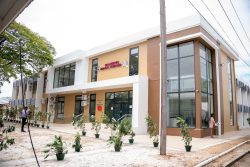By Karen Abrams
Karen Abrams is a Consultant for the Tech Industry. Her specialty is encouraging the participation of under-represented groups in creating technology ‘startup’ ventures. Abrams holds an MBA degree in Marketing.
Linda Rottenberg and Chris Bierly recently set out to study just how entrepreneurship could be made contagious. They clearly understood that entrepreneurship drove economic development, innovation and job creation, but wanted to figure out what factors could cause an explosion of startups thereby changing the fortunes of communities, cities, and even countries.
Rottenberg was named one of America’s Best Leaders by US News & World Report and one of TIME’s 100 Innovators for the 21st century, and is author of the New York Times bestseller, Crazy Is a Compliment: The Power of Zigging When Everyone Else Zags. She is also the co-founder of a startup accelerator, Endeavor, which supports high-impact entrepreneurs. Chris Bierly is a Vice President and Director in Bain Capital’s Boston office, and a leader in its principle investments, media, education, and consumer and retail areas. Bierly is a senior advisor at Endeavor.

Rottenberg and Bierly convincingly argue that the best incubator for entrepreneurship occurs when entrepreneurs form close networks and nurture fellow risk-takers with their experience and resources. The duo is clear on the fact that entrepreneurship can be contagious, and they offer that the best way to spread it is to give a handful of pioneer founders what they need to grow. After a ‘Patient Zero’ gets on her feet, she can mentor, inspire, and reinvest her time and money to infect others. In these groups, collaboration and tough love prevail, rather than a survival-of-the-fittest attitude.
In other words, if stakeholders truly want to build a thriving entrepreneurial ecosystem, high-impact entrepreneurs, operating in tight-knit networks, nurturing fellow risk-takers and trading know-how, capital and tough love were the keys to setting off this explosion. The bootstrap entrepreneurship model won’t do it, bold individualism won’t do it and government stimulus alone won’t be able to do it.
Evidence of the validity of their theory is clearly visible in the startup scenes they studied in Mexico City, Istanbul, Buenos Aires. In Buenos Aires, amid economic and political strife in the 1990’s, Wences Casares, the son of a Patagonian sheep farmer, who had dabbled in business as a teenager, starting a T-shirt company and printing a telephone directory; had the idea while in college, to start an online brokerage called Patagon.com. Thirty-three local investors turned him down. He quit school and launched the company anyway.
While getting his business started in 1997, he met others burning with this strange passion. These included Andy Freire and Santiago Bilinkis, alums from Procter & Gamble who founded an online office-supply company called Officenet. Not long after, a pair of Stanford MBAs, Marcos Galperin and Hernán Kazah, returned to the country to form MercadoLibre, an eBay-style online retailer.
Together they created an informal support network, essentially a breeding ground for entrepreneurship and one fuelled by shared information, rivalry, co-investment and the conviction that they were pioneers, and supported by a novel consortium of local business leaders and outside mentors, they enabled a fever of entrepreneurship to overtake Buenos Aires. In the span of a few years, Casares sold Patagon to Banco Santander for $750 million; Officenet sold to Staples; and MercadoLibre went public on the NASDAQ, reaching a market capitalization of $5.5 billion in 2014.
Today, Buenos Aires is in the midst of an entrepreneurship epidemic. Two decades after MercadoLibre, Patagon, and Officenet got their start, the city is the leading hub for tech entrepreneurship in Spanish-speaking Latin America. These three firms alone have influenced more than 200 second, third, and fourth-generation businesses. Their founders have launched new companies, VC funds, and even a popular TV show about entrepreneurship (“El Emprendedor del Millón”). Whereas Argentine entrepreneurs once felt isolated and mistrusted, now anyone with a dream can tap into a thriving ecosystem of support. There are conferences, meetups, bars where founders congregate, dance clubs where they mingle, even a soccer league where each team is named after a start-up. Entrepreneurship has become a national obsession.
Today, nearly 80% of tech companies in Buenos Aires trace their roots to Patagon, Officenet and MercadoLibre. These first-generation tech entrepreneurs were the super-carriers of the entrepreneurship virus. While their companies were individually successful, the firms had their biggest impact on the network by mentoring new entrepreneurs, investing capital in their companies, supplying experienced talent, and starting new ventures themselves.
There are many lessons for Guyana in Rottenberg and Bierly’s contagious entrepreneurship research. Young tech entrepreneurs in Guyana are encouraged to work together to create support networks, to strengthen their skills, to share ideas and to connect with local investors. Local tech entrepreneurs must also consider Guyana, the Caribbean and the world as potential markets for the tech solutions they build. Working together and leveraging each other’s talents is a good way to start to develop a local and thriving tech ecosystem in Guyana, but we need a few committed and talented women and men to incubate the virus and make it ready for infection.








